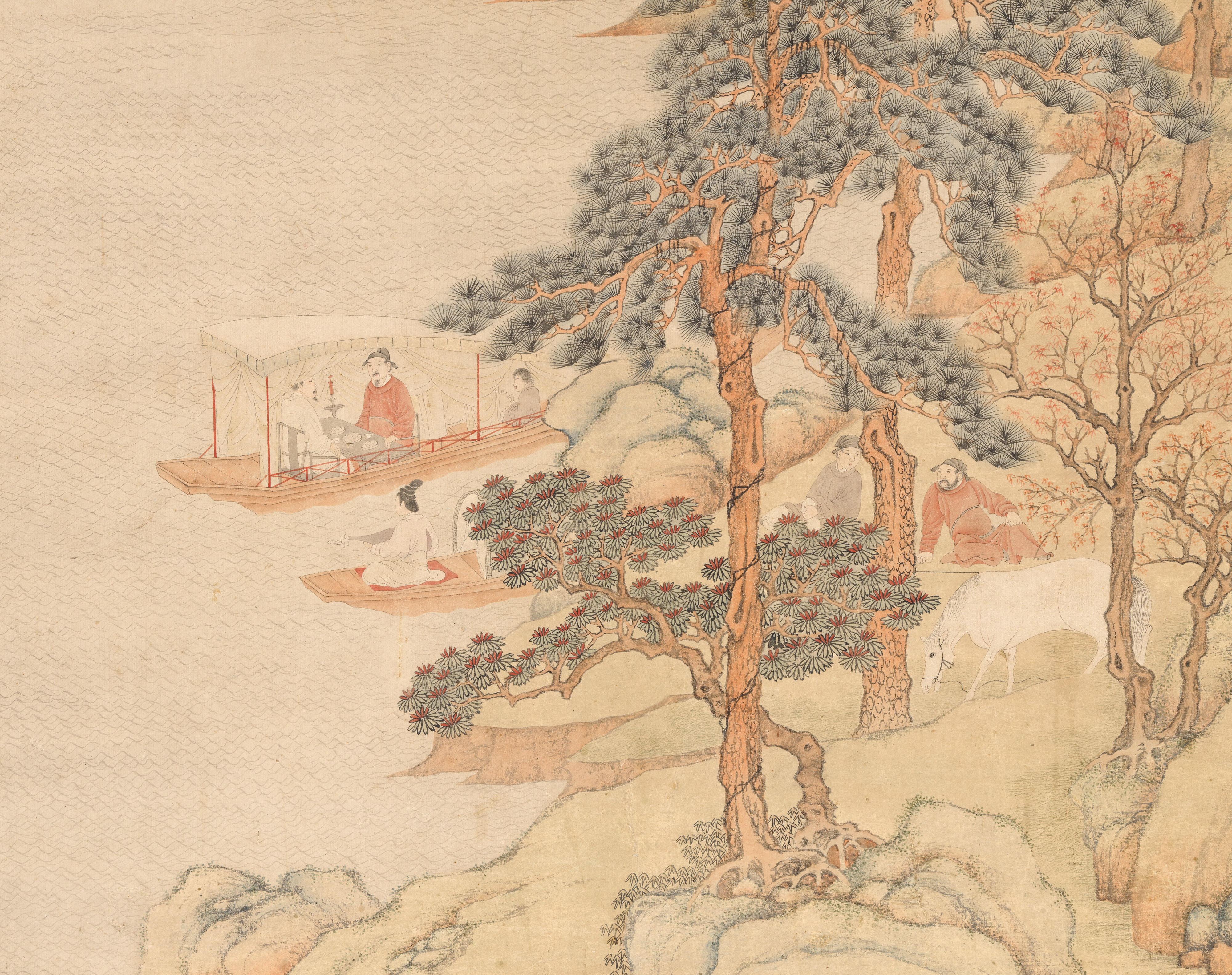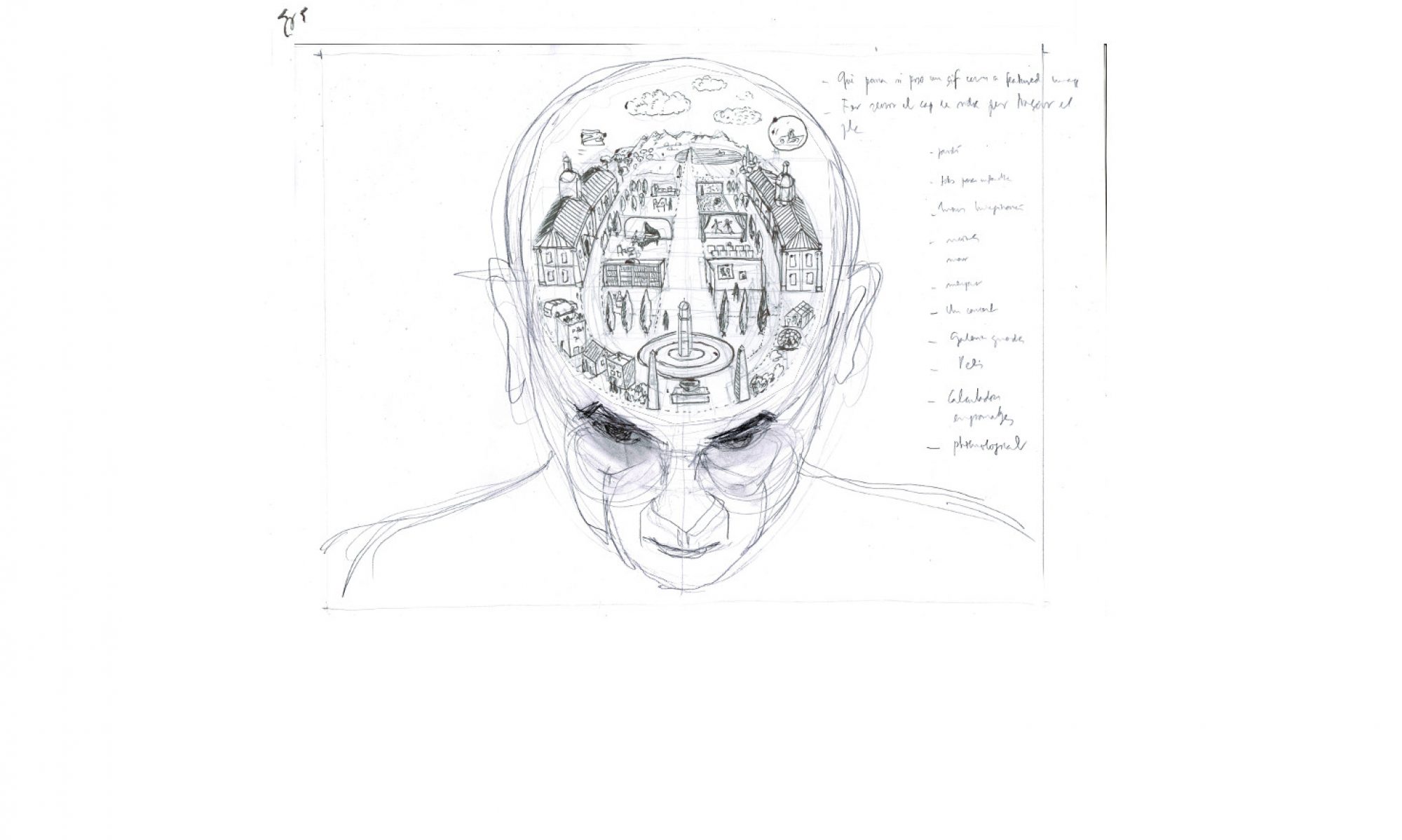Literatura xinesa Tang
LA CITARA
Deixo la cítara sobre la taula
i m’assec ple d’emoció.
No em cal polsar-ne les cordes:
el vent fa que sonin soles.
(Manel Ollé)
Night Rain
Chirp of an early cricket. Silence.
The lamp dies then flares up again.
Night must be raining outside the window:
plink, plunk on the banana leaves.
Song of an Evening River
A ray of setting sun paves the water,
half the river is emerald, half the river ruby.
I love the third night in the ninth month-
dewdrops turn into pearls, the moon into a bow.
Balada del llaüt
(el poeta explica que, trobant-se amb un amic al vespre en un vaixell va sentir algú que tocava el llaüt en una embarcació. Era una prostituta de la capital, ara ja gran, que havia après a tocar amb els mestres Mu i Cao. Després d’una joventut admirada per tothom, en fer-se gran i decaure la seva bellesa s’havia casat amb un mercader. (Antologia de Barnstone i Ping p. 174)
Seeing off a guest at night by the Xunyang River,
I felt autumn shivering on maple leaves and reed flowers.
I dismounted from my horse and my guest stepped on the boat;
we raised our cups for a drink without the music of pipes or strings.
We got drunk but not happy, mourning his departure.
When he embarked, the moon was half drowned in the river.
Suddenly we heard a lute sing across the water
and the host forgot to return home, and the guest stopped his boat.
Following the sound we softly inquired who the musician was,
the lute fell silent and the answer came after a pause.
We steered our boat close and invited her to join us,
with wine refilled and lamp relit, our banquet opened again.
It took a thousand pleases and ten thousand invitations before she appeared,
though with her lute she still hid half her face.
She plucked a few times to tune her strings.
Even before the melody formed one felt her emotion.
Each string sounded muted and each note meditative,
as if the music were narrating the sorrows of her life.
With eyebrows lowered she let her hands freely strum on and on,
pouring pent-up feelings out of her heart.
Softly strumming, plucking, sweeping, and twanging the strings,
she played “Rainbow Garment” then “Green Waist.”
The thick strings splattered like a rain shower,
the thin strings whispered privately like lovers,
splattering and whispering back and forth,
big pearls and small pearls dropping into a jade plate.
Smooth, the notes were skylarks chirping under flowers.
Uneven, the sound flowed like a spring under ice,
the spring water cold and strained, the strings congealing silence,
freezing to silence, till the sounds couldn’t pass, and were momentarily at rest.
Now some other hidden sorrow and dark regret arose
and at this moment silence was better than sound.
Suddenly a silver vase exploded and the water splashed out,
iron horses galloped through and swords and spears clashed.
When the tune stopped, she struck the heart of the instrument,
all four strings together, like a piece of silk tearing.
Silence then in the east boat and the west.
All I could see in the river’s heart was the autumn moon, so pale.
Silently she placed the pick between the strings,
straightened her garment and stood up with a serious face.
She told us, “I was a girl from the capital,
lived close to the Tombs of the Toad.
I finished studying lute at the age of thirteen,
and was first string in the Bureau of Women Musicians.
When my tunes stopped, the most talented players were humbled,
other girls were constantly jealous when they saw me made up,
the rich young city men competed to throw me brocade head scarves,
and I was given countless red silks after playing a tune.
My listeners broke hairpins and combs when they followed my rhythm.
I stained my blood-colored silk skirt with wine
and laughed all year and laughed the next,
and autumn moon and spring wind passed unnoticed.
My brother was drafted and my madame died.
An evening passed, and when morning came my beauty was gone.
My door became desolate and horses seldom came,
and as I was getting old I married a merchant.
My merchant cared more about profit than being with me.
A month ago he went to Fuliang to buy tea.
I am here to watch this empty boat at the mouth of the river.
The bright moon circles around the boat and the water is very cold.
Deep into the night I suddenly dreamed about my young days
and wept in dream as tears streaked through my rouge.”
I was already sighing, listening to her lute,
but her story made me even sadder.
I said, “We both are exiled to the edge of this world
and our hearts meet though we’ve never met before.
Since I left the capital last year,
I was exiled to Xunyang and became sick.
Xunyang is too small to have any music;
all year round I heard no strings or pipes.
My home is close to the Pen River, low and damp,
and yellow reeds and bitter bamboo surround the house.
What do you think I hear there day and night?
Cuckoos chirping blood and the sad howls of apes.
Spring river, blossoming morning and autumn moon night-
I often have my wine and drink by myself.
It is not that there are no folk songs or village flutes,
but their yawps and moans are just too noisy for my ear.
Tonight I heard your lute speak and my ear pricked up, listening to fairy music.
Please don’t decline, sit down to play another tune,
and I’ll write a ‘Song of the Lute’ for you.”
Touched by my words she stood there for a long time,
then sat down and tuned up her strings and speeded up the rhythm.
Sad and touching it was different from her last song
and everyone started to weep.
If you ask, “Who shed most tears in this group?”
The marshal of Jiangzhou’s black gown was all wet.
Balada de la tañedora del laúd
De noche fui a la orilla del río
para despedirme de un amigo.
Sentía el melancólico susurro
de la hojas de los arces
y de las flores de los juncos.
Bajé del caballo.
Ya me esperaba en la barca.
Levantamos las copas y apuramos.
¡Qué lástima no tener
laúdes y flautas
para aprisionar el instante!
El vino no nos dio alegría.
Bajo una luna bañada
en la inmensidad del agua
íbamos a separamos,
tristes, cuando de repente
nos llegaron cautivantes
dulces voces de un laúd
y fuimos retenidos.
Preguntamos en voz baja
quién lo pulsaba.
Cesó la música
sin adelantar respuesta.
Aproximamos la barca.
De nuevo encendí la lámpara.
Volvimos a poner la mesa;
llenamos de vino las copas,
y a la tañedora invitamos.
Sólo tras ruegos repetidos
apareció, con el laúd en los brazos,
y medio cubierto el rostro.
Templa las cuerdas
y, aún sin interpretar,
llena el espacio de emoción.
Una a una vibran de tristeza,
y cada acorde es un lamento
de indescriptibles sufrimientos.
Inclinando la cabeza,
ella sigue tocando,
y así se desahoga
de infinitas penas.
Ora puntea las cuerdas,
ora las rasga;
tañidos fuertes,
después ligeros.
Primero nos endulza
«Vestido de Arco Iris»,
y luego «Verde Cintura».
De las cuerdas gruesas
se desata una furiosa tormenta,
y de las delgadas,
el alegre murmullo de muchachas.
Notas sonoras se mezclan
con susurrantes notas.
Perlas grandes y pequeñas
caen en un plato de jade,
y en medio de frescas flores
trinar y trinar alegres.
Por debajo del límpido hielo,
vienen sollozos de un arroyo.
Congélanse y cesan luego.
¡Qué tristeza más profunda
mora en el fondo del alma!
Por instantes el silencio
expresa más que la música.
De pronto, quebrado jarrón de plata
y agua esparcida, cristalina.
Oigo el galope de corceles
y furiosos ruidos de sables y jinetes;
la ejecución termina.
Por entre las cuerdas
que suenan como al rasgarse
una tela de seda,
el plectro se retira.
De silencio están cubiertas
las dos barcas.
Sólo la luna plateada
yace en el centro del río.
Indecisa, la tañedora
guarda el plectro.
Se estira la ropa,
grave la expresión,
se levanta y dice:
«Nací en la capital;
vivía mi familia
cerca del Mausoleo Siamo.
A la edad de trece
aprendí a tañer el laúd,
y mi nombre estaba en la lista
de las tañedoras más destacadas.
Cada vez que interpretaba,
los maestros me prodigaban elogios,
y con mi bello rostro
me convertí en la envidia
de las artistas celebradas.
Los jóvenes ricos se disputaban
por galantearme y obsequiarme.
Para escuchar una sola pieza
me regalaban con seda abundante;
quebraban, para llevar el compás,
mis horquillas floreadas de plata,
y el vino que derramaban
regaba mi falda púrpura.
Entre acordes y risas
un año siguió al otro.
Pasó el viento de primavera.
Se ocultó la luna de otoño.
El ejército se llevó a mi hermano,
y la muerte, a mi tía.
Se marchitó la flor de mi vida.
Cada vez menos carruajes
se estacionaban frente a mi puerta.
Casé con un comerciante,
quien me trajo a esta aldea.
La separación le importa nada:
a él sólo le atraen las ganancias.
Salió a comprar el mes pasado,
dejándome sola en la barca,
acompañada de la luna
y el gélido río.
Muchas veces, en las noches avanzadas,
sueño con mis felices tiempos pasados,
y corren las lágrimas
como por arroyuelos rosados.»
Escuchando la ejecución,
me penetraba su lamento,
y la desconsolada narración
me carga un pesado dolor.
Estamos en orfandad de la suerte,
y para comprendernos
nos basta un solo encuentro.
«Abandoné la capital el año pasado,
y vine desterrado, enfermo.
En este lugar apartado
no oí ni una canción hermosa
desde tan largo tiempo.
Vivo a la orilla del río,
en húmedo y bajo paraje;
mi casa está rodeada
de cañas amargas
y amarillos juncos.
A mis oídos sólo llegan
desgarradores lamentos de cucos
y aullidos melancólicos de monos.
En las florecientes mañanas de primavera
y en las otoñales noches de luna,
ante una jarra de vino, bebo solo.
Aunque se oyen coplas y flautas,
son feas y me desagradan.
Esta noche me ha sido deleitante
al escuchar su interpretación.
Me purificó el corazón
y me parecieron melodías
de las divinidades.
Le ruego que nos toque algo más.
Improvisaré un poema titulado
La Tañedora del Laúd
y a usted va dedicado.»
La bella dama, conmovida,
permanece de pie largo rato.
Luego se sienta
y, con cadencias aceleradas,
pulsa las cuerdas.
Vibran tan desconsoladas,
que arrancan a todos lágrimas.
El que compone este poema,
bañada su túnica,
es quien llora con más tristeza.
Bai Juyi (772 – 846)
També anomenat “Pipa Xing”.



